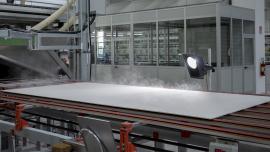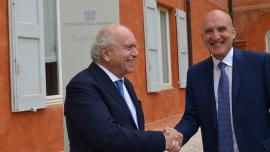Alarm over unsustainable energy costs in Sassuolo and Castellón
Energy bills, that have more than tripled since the beginning of the year, are wiping out the effects of the economic recovery. The risk for some companies is to be forced to reduce production in the coming months
The growing fears expressed repeatedly over the summer months have built up into a full-throated cry of alarm from Europe’s two largest ceramic tile producing areas, Sassuolo and Castellón. Energy costs have been rising since the beginning of the year and have literally skyrocketed since September, wiping out the effects of the post-pandemic economic recovery for the Italian and Spanish tile manufacturers at a time when production levels need to be pushed to the limit to meet double-digit growth in orders. The experts are not expecting prices to fall significantly over the coming months, so despite the boom in domestic and international demand there is a very real risk that the industry will be forced to cancel orders and turn off kilns due to energy bills that in Italy have more than tripled since the beginning of the year and in Spain grew by an average of 148% between January and September, according to Ascer estimates.
The situation in Italy
In Italy, companies like the Romani Group (8 million sqm/year of tile production) have seen electricity prices rise from €45-50/MWh in January to €210/MWh in October and gas prices jump from €0.2/MWh to over €1/MWh, equivalent to an increase in the annual energy bill from €8 million to €25 million, according to chairman Giorgio Romani on his LinkedIn account.
The trade association Confindustria Ceramica calculates that at current prices the Italian tile industry will incur a gas bill of €1.25 billion in 2022, almost a quarter of the sector’s turnover. This cost is clearly not sustainable for a production factor that already accounts for more than 25% of manufacturing costs.
“With these costs, the Italian ceramic industry will be able to keep going until the first quarter of 2022 at the latest,” Confindustria Ceramica Chairman Giovanni Savorani told Italian business newspaper Il Sole 24 Ore. Mr Savorani also headed the delegation of entrepreneurs received by the Deputy Minister for Economic Development in the Italian Senate on 20 October, where discussions centred on the need for urgent action to curb prices alongside other measures to alleviate the current emergency (including measures to prevent speculation in the ETS market, the recognition of correct levels of compensation, and the possibility of extending social shock absorbers to exceptional and objectively unavoidable events, such as the present situation).
The Spanish tile industry is also in a state of emergency
Spain is experiencing a similar state of emergency. In a statement issued on 6 October, the national trade association ASCER announced that the sector’s total energy bill may be more than 148% higher this year than in 2020 based on the gas and electricity prices reported at the end of September. Gas prices in Spain’s organised market grew from an average of €27.08/MWh in January to €65.2/MWh in September (+140%), while electricity prices rose from €60.17/MWh to €156.14/MWh in the same period (+160%). For the sector as a whole, these figures would mean additional costs of more than €700 million per year, which is already unsustainable without considering any further rises over the next six months (on 5 October, the TTF index closed at €116/MWh for gas and trading in the Spanish “pool electrico” market reached €203.68/MWh for electricity).
According to ASCER, while sector companies have little choice but to pass the cost increase on to customers, this will result in a loss of share in the international markets where the Spanish tile industry makes 75% of its sales. While these markets are extremely competitive due to the presence of players with decidedly lower costs, they are also characterised by different spending capacities and are not always able to absorb price increases. In the absence of urgent government measures (such as partial compensation for CO2 costs and temporary subsidies to mitigate the impact of soaring energy prices), the association believes the most immediate risk is the reduction or suspension of production, which would have serious repercussions for employment in the sector.
One person who is trying to avert the impact of a situation described as “disastrous” on his 4,000 employees is Fernando Roig, chairman of the Pamesa Group, Europe’s largest tile manufacturer with a production capacity of almost 120 million sqm/year. In an interview with El Periodico del Azulejo, Roig said that his group will be facing a gas bill of €25-30 million in November and December compared to the €7-8 million paid in January, with no price cuts expected for at least the next six months. As well as cancelling its participation in Cevisama 2022, the Group has already raised its prices by between 15% and 20% depending on the products, equivalent to a jump of around one euro per square metre. This is a substantial increase and may reduce the company’s competitive advantage over Italian producers, but Roig believes it is an unavoidable measure that Spanish companies will have to implement to guarantee the sustainability and survival of the sector.
In the meantime, some good news has been announced by Gasindustrial, which in its 26 October bulletin reported a slower rate of increase in gas prices between 9 and 22 October.
Did you find this article useful?
Join the CWW community to receive the most important news from the global ceramic industry every two weeks
























